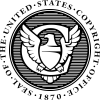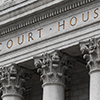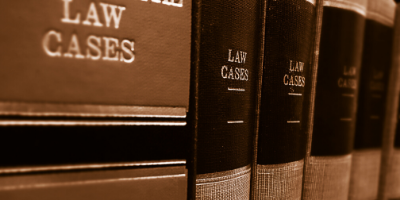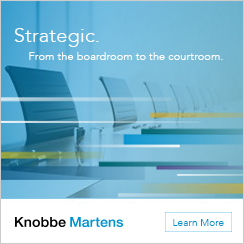Quarterly Journal Volume 53, Issue 3
In This Section
The Quarterly Journal is dedicated to presenting materials relating to intellectual property matters and is published four times per year. Editorial Board members (all of whom are lawyers) are selected based upon demonstrated interest and experience, and student staff members are selected from the students of the GWU Law School.
 QJ 53.3 - Small Claims, Big Problems: A Critical Look at the Copyright “Small Claims Court”
QJ 53.3 - Small Claims, Big Problems: A Critical Look at the Copyright “Small Claims Court”
K.C. Webb
SMALL CLAIMS, BIG PROBLEMS: A CRITICAL LOOK AT THE COPYRIGHT “SMALL CLAIMS COURT”
Copyright has a “small claims” problem. The cost of formal legal action often exceeds potential damages amounts. Copyright owners are deprived of any meaningful remedy, and infringement goes undeterred. To address this, the United States created a voluntary, low-cost quasi-court (the Copyright Claims Board, "CCB") within the Copyright Office to adjudicate claims involving damages up to $30,000. However, after looking over the first 250 cases filed, it seems the problem is far from fixed. Perhaps with some legislative tweaking, it may improve enough to justify the cost imposed on taxpayers. This paper takes a critical look at the CCB's first 250 cases to determine whether it is living up to the policy goals, and what may be done to improve, taking lessons from other copyright small-claims projects abroad.
 QJ 53.3 - Marked by Faith: A Justification for Religious Fair Use in Trademark Infringement Disputes
QJ 53.3 - Marked by Faith: A Justification for Religious Fair Use in Trademark Infringement Disputes
Summer Basham Todd
MARKED BY FAITH: A JUSTIFICATION FOR RELIGIOUS FAIR USE IN TRADEMARK INFRINGEMENT DISPUTES
At the heartbeat of American jurisprudence is the freedom of religion. Under the First Amendment, religious works and symbols, taking shape as religious expression, are fiercely guarded and held sacred. Yet, trademark law may compete with First Amendment protections when religious expression is brought within its ambit. Accordingly, trademark law must be applied in a manner that respects and accommodates religious expression. However, as this Note explores, trademark law often operates to preference certain religious groups at the expense of others and to burden the free exercise of religion when one group sues another to protect the exclusive use of a religious mark in a trademark infringement dispute. Accordingly, this Note proposes a novel fair use defense—religious fair use—to trademark infringement claims in an effort to achieve a better balance in the public interest in protecting trademark rights against the public interest in protecting religious freedoms.
 QJ 53.3 - The Dewberry Dilemma: How the Supreme Court Has Created a Freeway for Infringement Under the Lanham Act
QJ 53.3 - The Dewberry Dilemma: How the Supreme Court Has Created a Freeway for Infringement Under the Lanham Act
Louis T. Juliano, Jr.
Trademark law is the fundamental protection for a commercial businesses’ brand. By creating a trademark for goods and services, consumers can identify the brand, which discourages confusion of the source of the mark while simultaneously protecting the reputation of the company. When a second company violates the trademark of the first, the second company is not only confusing the consumer, but unjustly takes potential profits from the registered trademark owner. The consequences of violating another brand’s trademark typically include monetary damages, as well as injunctive relief. But can injunctive relief accurately remedy missed sales due to trademark infringement for a company that claims no profits? This Note focuses on the Supreme Court’s decision in Dewberry Group v. Dewberry Engineers; a long standing trademark dispute, resulting in Dewberry Group being found liable for trademark infringement, before the Supreme Court vacated the decision for remand. Finding that a company’s affiliates, when unnamed as a party, do not constitute “defendant’s profits”, the Supreme Court has essentially created a pathway for infringers to avoid monetary liability. This Note discusses the issues with the case, the problems with the Supreme Court’s ruling, and possible negative outcomes stemming from this decision.
Upcoming Events
-
.png?sfvrsn=48c235e_1) 2026 Patent Prosecution Bootcamp - Arlington, VA
2026 Patent Prosecution Bootcamp - Arlington, VA
March 4 to 6, 2026 | Up to 1235 minutes, including 60 Ethics minutes
-
 AIPLA CLE Webinar: Damages 2025 Year-in-Review: Lessons and Litigation Strategies
AIPLA CLE Webinar: Damages 2025 Year-in-Review: Lessons and Litigation Strategies
March 11, 2026 2:00 PM to 3:30 PM | Eligible for up to 90 Mins CLE
-
.png?sfvrsn=20d96f46_1) AIPLA LinkedIn Live: What the 2025 AIPLA Economic Survey Reveals About IP Practice Today
AIPLA LinkedIn Live: What the 2025 AIPLA Economic Survey Reveals About IP Practice Today
March 12, 2026 12:00 PM to 12:45 PM
-
2026 Women in IP Global Networking Event
April 16, 2026
The annual Global Networking Event connects intellectual property practitioners from around the world for a day of networking, education, and creating meaningful connections. This year’s theme, Rooted in Real - Women in IP Redefining the Narrative, is an opportunity for the AIPLA Women in IP Law Committee to celebrate authentic experiences, foster genuine connections, and showcase the real stories of women shaping the field of intellectual property law. -
-(1).png?sfvrsn=169c8b82_1) Careers in IP
Careers in IP
April 22, 2026 12:30 PM to 1:30 PM | No CLE

